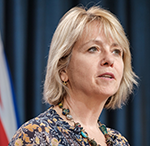B.C. reveals more detail on COVID-19 vaccine plan; second doses pushed to four months
Everyone who wants to be vaccinated against COVID-19 can have their first jab by July, an expedited timeline made possible by increasing the waiting period for second shots to 16 weeks from six.
Under the updated plan, second doses, also called booster shots, will be delayed until four months after the first — well beyond the 42 days in B.C.’s previous plan and the 21 days recommended by manufacturers.
Henry said the decision to delay the second shots is based on the “miraculous” protection provided by the first dose of the Pfizer-BioNTech and Moderna vaccines, which appear to be 90 per cent effective.
The National Advisory Committee on Immunization is expected to issue a statement to align with B.C.’s decision, which is based on similar data from Quebec and countries including Israel and the United Kingdom, she said.
“Extending this second dose provides very high real-world protection to more people sooner,” Henry said. It immediately frees up 70,000 doses.
A call-in registration system will open March 8 for seniors 90 and older, with vaccinations beginning a week later. Vaccines will take place in local clinics, but home-bound seniors who may receive home support and other services will be vaccinated in their homes via mobile units.
Those 85 and older will be able to register starting on March 15, with their vaccinations starting a week later. People 80 and up will have a chance to book their time-slot on March 22.
Residents between the ages of 60 and 79 as well as people 16 and older who are medically vulnerable are expected to get their shots starting in mid-April by registering for an appointment online.
Mass vaccination clinics are expected to open across the province in April, with the last of the first round of doses going to 18-to-24 year olds by July. Second doses will then begin.
Health authorities will stop scheduled second doses this week and start giving those shots to people in high-risk groups who remain unvaccinated.
Dr. Richard Stanwick, chief medical health officer for Island Health, said deferring second doses means more people will get their first dose sooner.
“We recognize that the change is a major inconvenience to many people who will be re-scheduled in the coming days, for which we sympathize, but this latest sequencing in vaccine doses will save lives,” he said.
“Within a few weeks, this shift will further reduce both the spread of COVID in the community and the associated harms the virus causes.”
Henry said first responders and essential workers, including teachers, may be eligible to get vaccinated starting in April as the province decides on a strategy for the newly authorized Oxford-AstraZeneca vaccine, with the first shipment expected to arrive in B.C. next week.
“We’ve had a number of places in communities around the province where we’ve had outbreaks. We can think about things like poultry workers [and] people who work in some of our mail distribution centres,” she said.
Premier John Horgan urged people to continue taking precautions — such as wearing masks, practising physical distancing and staying home when sick — aimed at reducing the spread of COVID-19 as vaccines become available.
“We have months to go and I want British Columbians to take the good news we’re hearing today with the joy that it deserves,” he said.
“But we need to remind ourselves not just today, but next week and next month, that we have a long way to go
About 275,000 doses of COVID-19 vaccine have been administered in B.C. Of those, 83,777 were second doses.
Dr. Penny Ballem, who is leading the province’s vaccination plan, said more than 400,000 additional high-risk people are expected to be vaccinated in the next month.
Ballem said it’s important for people to call for an appointment only when it is their turn, or when the person they’re calling for is eligible for vaccination in order to prevent call centres from being overwhelmed as has happened in other jurisdictions.
Information that will be required includes a birth date, personal health number and a postal code to connect people to the right health authority, she said, adding that an online booking system will be operating by mid-April.
Ballem asked people not to fret if they miss registering. No one will lose their priority place in line.
“Once they’re eligible they can call any time after that,” she said. “We want everyone to understand that they don’t have to rush to be the first caller, they will get their vaccine.”
Article published in the Times Colonist
indy E. Harnett/ Times Colonist
— With Camille Bains, The Canadian Press


